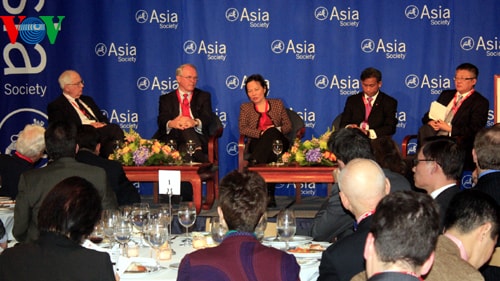Dispute Resolution is the Focus of the International Conference on the East Sea
The workshop analyzed the causes of tension in the East Sea, the role of international law, US-China relations, etc.
An international conference was recently held in New York, USA with the participation of prestigious scholars from the US, Vietnam, China, Australia, UK, Philippines and Singapore.

Delegates attending the workshop
The workshop analyzed the causes of tension in the East Sea, the role of international law, US-China relations and the role of ASEAN in resolving maritime disputes.
Scholars believe that the causes of tension in the East Sea in recent times include: the attraction of huge oil and gas reserves and aquatic resources, China's claims, its strategic geopolitical position as well as the vital shipping routes in this sea area.
At the Workshop, representatives of Vietnam
Director of the Chinese National Defense Institute, Zhu Chenghu, said that tensions in the East Sea are partly related to the US's rebalancing policy, focusing resources on the Asia-Pacific region. China suspects that this policy will restrain its development. According to Zhu Chenghu, both China and the US have common interests in the East Sea and both sides hope to maintain peace and stability in the East Sea, ensure freedom of navigation, not further complicate the situation, avoid military confrontation and find peaceful solutions to conflicts in the East Sea.
Many scholars believe that rising nationalism in some countries, especially China, is making the situation more complicated. Former US Assistant Secretary of State for East Asia and the Pacific, Christopher Hill, believes that China needs to identify its core interests and find ways to reconcile these interests with those of ASEAN countries. Mr. Hill emphasized that maritime disputes require a more modern, mutually beneficial approach, and that China's current bilateral approach is not appropriate.
Mr. Christopher Hill said: "China's core interest is not necessarily the South China Sea but the peaceful resolution of the dispute with neighboring countries. I think that maritime disputes with neighboring countries do not bring any benefits to China. China is emerging and becoming a global country. How to manage relations with neighboring countries is a key issue for China itself as well as the whole world. China has a historical legacy of up to 4,000 years to consider how to behave towards neighboring countries. The US has drawn some lessons in its relations with small countries in Latin America and is trying to find a way to make these countries realize that we respect their interests to the maximum."
Yang Fang, a research fellow at the Center for Asia and Globalization in Singapore, said that the Declaration on the Conduct of Parties in the East Sea (DOC) has helped prevent major conflicts between the parties involved, especially military conflicts since 2002. However, the parties need to quickly promote the Code of Conduct in the East Sea (COC), a legally binding agreement.
Representative of
Patrick Cronin, Director of the US Asia-Pacific Security Program, also commented on the lawsuit.
Looking at solutions in the East Sea, Professor Huang Jing, Director of the Center for Asia and Globalization of the
Professor of Southeast Asian Politics Duncan McCargo of the University of Leeds in the UK suggested that the first step in resolving the dispute in the East Sea is to promote international law while maintaining existing institutions with ASEAN at the center such as the ASEAN Regional Forum and the ASEAN Defense Ministers' Meeting, addressing the issue of increased defense spending that is causing distrust among countries and strengthening US-China relations in the direction of cooperation instead of confrontation. Resolving the dispute in the East Sea is a long-term process, requiring patience and positivity from all parties./.
According to VOV-M






